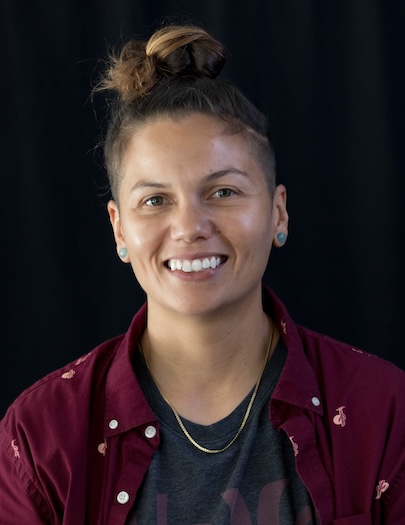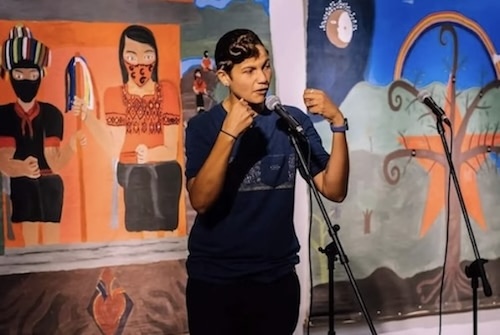
Faculty Spotlight: Professor Jenna Robinson
 ÔÇ£I really like teaching at the 91¥½ãÀ because it isn't an art space, so itÔÇÖs really special when I bring arts into the classroom,ÔÇØ explained Professor Jenna Robinson, a part-time core faculty member in the 91¥½ãÀ's Counseling Psychology Program. ÔÇ£I get to invoke something in people and show them that, even if theyÔÇÖre not dedicating themselves to being an expressive arts therapist, they can still bring art and play into their work as therapists.ÔÇØ
ÔÇ£I really like teaching at the 91¥½ãÀ because it isn't an art space, so itÔÇÖs really special when I bring arts into the classroom,ÔÇØ explained Professor Jenna Robinson, a part-time core faculty member in the 91¥½ãÀ's Counseling Psychology Program. ÔÇ£I get to invoke something in people and show them that, even if theyÔÇÖre not dedicating themselves to being an expressive arts therapist, they can still bring art and play into their work as therapists.ÔÇØ
Professor Robinson grew up in Los Angeles with one sister and five brothers. ÔÇ£My mom is white and my dad is African-American, which was a big thing for me growing up,ÔÇØ she reflected. ÔÇ£People couldnÔÇÖt really place what I was or who I was, especially in the neighborhood I grew up in.ÔÇØ Her mother is a child of immigrants from Slovakia, so Professor Robinson was always much more conscious of culture than many of her peers. She attended a Greek Orthodox elementary school, then public middle and high schools. Public school was a better fit for Professor Robinson, with less rigidity, more diversity, and a wide array of interests to pursue. ÔÇ£As a little kid, I went through a lot,ÔÇØ she shared, ÔÇ£And the thing that helped was that my mom got a suggestion to sign me up for community theater. Once I started doing musicals as a little kid, all of the singing and dancing really transformed my life.ÔÇØ This led Professor Robinson to begin nurturing her inner artist, which is a big part of the work she does today.
For her undergraduate studies, Professor Robinson attended the in Honolulu to throw shot put on their track and field team, but what really drew her to Hawaii was the culture. ÔÇ£When I went to Hawaii as a visitor with my family, people just assumed I was from there because most people in Hawaii are mixed,ÔÇØ she recalled. ÔÇ£I felt like the environment, the temperature, and just their way of being was more aligned with who I am.ÔÇØ Professor Robinson studied History and Ethnic Studies because she was very interested in stories and understood the importance of people telling their own stories. ÔÇ£My life, my culture, and my familyÔÇÖs history have taught me that you have to speak up for yourself,ÔÇØ she shared. ÔÇ£Oppressed people have to tell their stories.ÔÇØ She graduated with a double major in History and Ethnic Studies in 2012.
After graduating, Professor Robinson went on to work at as a Social Service Aide for two years. Her primary role was to do drug testing for youth on probation and assist Probation Officers. While there, she also led poetry workshops and creative writing classes for incarcerated adolescent girls. Girls Court Hawaii is a pioneering organization that focuses on adolescents who identify as female and makes sure that everyone who is part of the court, from probation officers to judges, also identify as female. ÔÇ£The vision of Girls Court is that if a child is in trouble, a family is in trouble and we have to have more family wrap-around services to support them,ÔÇØ she explained. ÔÇ£I think that transformed my understanding of serving children and adolescents, the idea that therapy or social services could come from a place of love, really radical love.ÔÇØ
 Her work at Hawaii Girls Court was one thing that led Professor Robinson to consider a career in the field of Psychology. The other was her work leading writing workshops as part of the slam poetry community. ÔÇ£What I found is that when I would teach these kids how to write their stories, the most horrific stories would come out,ÔÇØ she recalled. ÔÇ£I felt so honored, but I also felt so unprepared to actually help them. For some kids, I was the first person that they told about a trauma and I would think, ÔÇÿWhat do I do with that?ÔÇÖÔÇØ Around the same time, as a finalist at the National Poetry Slam in Oakland, she met Dr. Danielle Drake, a professor in the . ÔÇ£When she was talking about the program, I was like, ÔÇÿOh my gosh, that is exactly what I've been thinking about!ÔÇÖÔÇØ Professor Robinson exclaimed. ÔÇ£It's not just about therapy, but the intersection of using all of the creative arts as the healing tools and I just kind of followed her.ÔÇØ She knew immediately that this was the right path for her.
Her work at Hawaii Girls Court was one thing that led Professor Robinson to consider a career in the field of Psychology. The other was her work leading writing workshops as part of the slam poetry community. ÔÇ£What I found is that when I would teach these kids how to write their stories, the most horrific stories would come out,ÔÇØ she recalled. ÔÇ£I felt so honored, but I also felt so unprepared to actually help them. For some kids, I was the first person that they told about a trauma and I would think, ÔÇÿWhat do I do with that?ÔÇÖÔÇØ Around the same time, as a finalist at the National Poetry Slam in Oakland, she met Dr. Danielle Drake, a professor in the . ÔÇ£When she was talking about the program, I was like, ÔÇÿOh my gosh, that is exactly what I've been thinking about!ÔÇÖÔÇØ Professor Robinson exclaimed. ÔÇ£It's not just about therapy, but the intersection of using all of the creative arts as the healing tools and I just kind of followed her.ÔÇØ She knew immediately that this was the right path for her.
Professor Robinson enrolled in the in the fall of 2016. She described her experience in their three-year program as ÔÇ£transformative,ÔÇØ covering the typical counseling psychology coursework with the addition of expressive arts courses. ÔÇ£It was revolutionary to me that I found this program that nurtured me as an artist but also gave me the practical skills I needed,ÔÇØ she shared. ÔÇ£They really believe in experiential learning, so you bring your stuff to class and all of the assignments are about understanding yourself and your issues and learning how you can process them through the arts.ÔÇØ Despite her love of the program, Professor Robinson confessed that it was challenging for her as well. ÔÇ£It was really difficult, but some of the things I learned forced me to make different choices about relationships and the ways that I care for myself,ÔÇØ she explained. ÔÇ£It was painful to actually make the changes, but I'm so grateful for who I am now because of it and I donÔÇÖt know if I would have been able to do that without the creative arts. Creativity is my life force.ÔÇØ In 2019, Professor Robinson graduated with her masterÔÇÖs degree in Counseling Psychology with an emphasis on Expressive Arts Therapy.
In 2017, Professor Robinson began working at , which describes itself as ÔÇ£a nonprofit that seeks to celebrate creative experimentation and practice.ÔÇØ Through their , they go into elementary, middle, and high schools to lead writing workshops with an emphasis on spoken word poetry. ÔÇ£I was talking with one of the founders, Patrick Ohslund, about the work I had done at Girls Court and my desire to do more therapeutic writing workshops, specifically with families,ÔÇØ she recalled, ÔÇ£so we created the Revisions program, which is not exclusive to families, but really emphasizes working with families through therapeutic writing.ÔÇØ From the programÔÇÖs start, Professor Robinson has served as the , leading creative writing programs and training others in spoken word poetry interventions.
From 2019-2020, Professor Robinson worked as a Child Clinician at , providing counseling to survivors of intimate partner abuse and their children. "What I realized working there is just how much family violence is in my immediate history and ancestry,ÔÇØ she reflected, ÔÇ£and I learned how much healing I needed to do in order to be a helper in that space.ÔÇØ Professor RobinsonÔÇÖs time at CORA also reinforced what she had learned working at Girls Court - you canÔÇÖt just work with a child and expect much change, you have to work with their family to help them support their child. One thing she disagreed with was CORAÔÇÖs policy of not working with the individuals who cause harm. ÔÇ£The survivors we work with arenÔÇÖt the ones making a choice to cause harm, so the trauma is going to continue until the person causing harm gets services,ÔÇØ she explained. ÔÇ£We need really compassionate, accountable healing structures for the people causing harm and then courageous family therapists who are willing to do that work.ÔÇØ
In 2020, Professor Robinson transitioned to the role of LGBTQ+ Clinical Coordinator at CORA, which she held until 2022. In this position, she had a wide array of responsibilities, including working with individual clients and groups, coordinating the program, developing trainings and workshops, and more. ÔÇ£I noticed in the research that LGBTQ folks often don't identify as people experiencing abuse, even when they are,ÔÇØ Professor Robinson recalled, ÔÇ£So I thought if we did preventative work, that would prevent people from getting into toxic relationships and catch the people who were already in really dangerous relationships.ÔÇØ She partnered with and they provided online courses to the local LGBTQ+ community. ItÔÇÖs been over a year since Professor Robinson left CORA, but the program she created is still making an impact.
Professor Robinson returned to the in 2020 as an adjunct faculty member. She described the experience of teaching somewhere she was formerly a student as ÔÇ£very weirdÔÇØ because many of her former professors are now her colleagues. ÔÇ£I had some things that came up when I was a student that I've been able to repair with those professors, which has been a really cool opportunity,ÔÇØ Professor Robinson explained. ÔÇ£I have a different insight and understanding of what was going on now.ÔÇØ As part of CIIS as a part-time core faculty member, she can now enact the changes she wanted to see as a student in the program.
In 2022, Dr. Veronique Thompson, a member of the 91¥½ãÀ Clinical Psychology Program faculty, attended a domestic violence training led by Professor Robinson and recommended that she pursue a position at the 91¥½ãÀ. That summer, Professor Robinson became an adjunct faculty member in the Counseling Psychology Program at the 91¥½ãÀ, and in the fall of 2023, she became a part-time core faculty member. In just two academic years, Professor Robinson has taught eight different courses in the program, including Family Therapy I: Traditional and Multicultural Awareness and Sensitivity this term. As a core faculty member, she led advising workshops on narrative therapy and expressive writing during the fall term and will continue offering other workshops in the coming terms. ÔÇ£I think folks have really appreciated some of those offerings,ÔÇØ she shared. ÔÇ£They enjoy being able to drop into those spaces to learn and experience new topics without the power dynamic of being graded.ÔÇØ
Professor Robinson was a panelist in the in September of 2023. ÔÇ£It felt kind of surreal to be on the radio and I didnÔÇÖt want to make a fool of myself,ÔÇØ she admitted, ÔÇ£But I felt much more comfortable than I thought I was going to.ÔÇØ In her interview on KQED, Professor Robinson explained that she gives her clients writing prompts because containment is helpful as rules and limits boost creativity. She also shared her practice of using junk journals with clients. ÔÇ£People use them to collage, but you can also write in them and some people even destroy them,ÔÇØ she explained. ÔÇ£I talk to everybody about the possibility of doing some sort of expressive writing or expressive arts in our work together, but not everybody is interested in it.ÔÇØ When her clients are interested, Professor Robinson finds that journaling, whether in writing or in ÔÇ£junk,ÔÇØ is an important therapeutic tool.
Currently, Professor Robinson is in the process of becoming a Registered Poetry Therapist, something sheÔÇÖs been interested in for years. During her second year at CIIS, she led a workshop at the conference. At the conference, Professor Robinson met many poetry therapists, including Dr. Sherry Reiter, a pioneer in the field of poetry therapy and a drama therapist. ÔÇ£It was really cool to have someone who holds the performance aspects as well as the poetry writing aspects just take me under her wing,ÔÇØ she shared. ÔÇ£She has radically changed my life; I owe a lot to her.ÔÇØ Dr. Reiter has mentored Professor Robinson throughout the years and now supervises her as she works to become a Registered Poetry Therapist.
 When asked about her personal hobbies and interests, Professor Robinson said, ÔÇ£I feel like IÔÇÖve woven a lot of my hobbies into what I do so that people pay me to do them, which is kind of cool.ÔÇØ She admits, however, that doing her hobbies professionally does take a little fun out of them. Outside of work, Professor Robinson enjoys music, gardening, reading, and listening to podcasts. She also enjoys spending time with her mini Australian Shepherd, Truffle, who she described as ÔÇ£a big ball of energy.ÔÇØ They go for a run together each day, either in their neighborhood or in the Oakland hills.
When asked about her personal hobbies and interests, Professor Robinson said, ÔÇ£I feel like IÔÇÖve woven a lot of my hobbies into what I do so that people pay me to do them, which is kind of cool.ÔÇØ She admits, however, that doing her hobbies professionally does take a little fun out of them. Outside of work, Professor Robinson enjoys music, gardening, reading, and listening to podcasts. She also enjoys spending time with her mini Australian Shepherd, Truffle, who she described as ÔÇ£a big ball of energy.ÔÇØ They go for a run together each day, either in their neighborhood or in the Oakland hills.
Professor RobinsonÔÇÖs advice for current and prospective 91¥½ãÀ Counseling Psychology Program students is not to take their studies so seriously. She has witnessed a lot of anxiety in graduate students and has found that it hinders studentsÔÇÖ ability to be themselves and discover their own identities. ÔÇ£The power of authenticity is really important as a therapist,ÔÇØ she explained. ÔÇ£Who are you? What do you bring to the table? Do you have the skills to reflect on who you are? Do you have the confidence to show up in your skin?ÔÇØ In Professor RobinsonÔÇÖs opinion, developing authenticity is far more important than being able to regurgitate facts. ÔÇ£You are the healing resource, so if youÔÇÖre able to be authentic and confident and grounded, you will help other people do that too.ÔÇØ
